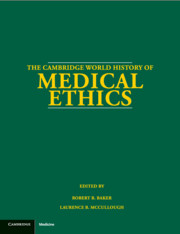Book contents
- Frontmatter
- PART I AN INTRODUCTION TO THE HISTORY OF MEDICAL ETHICS
- PART II A CHRONOLOGY OF MEDICAL ETHICS
- PART III DISCOURSES OF MEDICAL ETHICS THROUGH THE LIFE CYCLE
- PART IV THE DISCOURSES OF RELIGION ON MEDICAL ETHICS
- PART V THE DISCOURSES OF PHILOSOPHY ON MEDICAL ETHICS
- PART VI THE DISCOURSES OF PRACTITIONERS ON MEDICAL ETHICS
- PART VII THE DISCOURSES OF BIOETHICS
- 38 The Discourses of Bioethics in the United States
- 39 The Discourses of Bioethics in the United Kingdom
- 40 The Discourses of Bioethics in Western Europe
- 41 The Discourses of Bioethics in Post-Communist Eastern Europe
- 42 The Discourses of Bioethics in Latin America
- 43 The Discourses of Bioethics in East Asia
- 44 The Discourses of Bioethics in South Asia
- 45 The Discourses of Bioethics in Sub-Saharan Africa
- PART VIII DISCOURSES ON MEDICAL ETHICS AND SOCIETY
- Appendix: Biographies: Who Was Who in the History of Medical Ethics
- Bibliography
- Index
43 - The Discourses of Bioethics in East Asia
from PART VII - THE DISCOURSES OF BIOETHICS
Published online by Cambridge University Press: 28 May 2012
- Frontmatter
- PART I AN INTRODUCTION TO THE HISTORY OF MEDICAL ETHICS
- PART II A CHRONOLOGY OF MEDICAL ETHICS
- PART III DISCOURSES OF MEDICAL ETHICS THROUGH THE LIFE CYCLE
- PART IV THE DISCOURSES OF RELIGION ON MEDICAL ETHICS
- PART V THE DISCOURSES OF PHILOSOPHY ON MEDICAL ETHICS
- PART VI THE DISCOURSES OF PRACTITIONERS ON MEDICAL ETHICS
- PART VII THE DISCOURSES OF BIOETHICS
- 38 The Discourses of Bioethics in the United States
- 39 The Discourses of Bioethics in the United Kingdom
- 40 The Discourses of Bioethics in Western Europe
- 41 The Discourses of Bioethics in Post-Communist Eastern Europe
- 42 The Discourses of Bioethics in Latin America
- 43 The Discourses of Bioethics in East Asia
- 44 The Discourses of Bioethics in South Asia
- 45 The Discourses of Bioethics in Sub-Saharan Africa
- PART VIII DISCOURSES ON MEDICAL ETHICS AND SOCIETY
- Appendix: Biographies: Who Was Who in the History of Medical Ethics
- Bibliography
- Index
Summary
INTRODUCTION
This chapter provides an account of the emergence of bioethics in China and Japan, both as a critique of their conventional medical ethics and as a movement within their medical ethics traditions. It addresses three main themes: (1) clinical decisions in the context of traditional physician paternalism, familism, and contemporary patient self-determination, (2) attitudes toward new medical interventions based on advanced medical technologies, and (3) health care system reform. This chapter will use these themes as heuristic examples to explore the development of bioethics, the understanding of bioethics, and the interaction between bioethics and traditional medical ethics in China and Japan.
PHYSICIAN PATERNALISM, FAMILISM, AND PATIENT SELF-DETERMINATION
During 1966–1976, due to the totalitarian restriction of the so-called cultural revolution, most Chinese scholars knew little of academic research in the humanities and social sciences made outside of mainland China. Only after China's new policy of reform and opening up in the late 1970s, Western (particularly American) bioethics, together with other contemporary Western inquiries such as psychology, sociology, and philosophy of science, came to be noticed by Chinese academia. Since that time, increasing numbers of bioethical conferences and publications have occurred in China. A Chinese professional journal called Medicine and Philosophy was established in 1980, which dedicated a major portion of its each issue to articles regarding ethical issues in health care. The journal also covers translation of Western bioethical papers into Chinese. In 1988, the first monograph on bioethics in the Chinese language appeared in China (Qiu 1988).
- Type
- Chapter
- Information
- The Cambridge World History of Medical Ethics , pp. 505 - 508Publisher: Cambridge University PressPrint publication year: 2008



